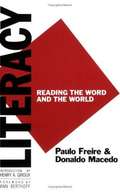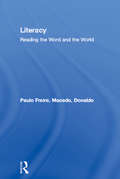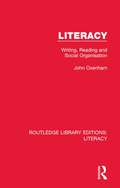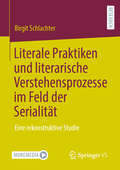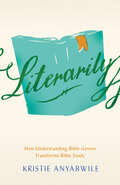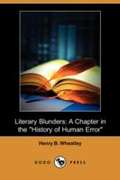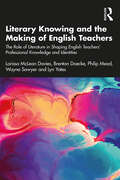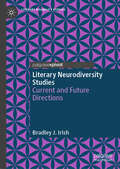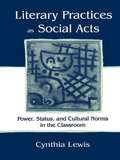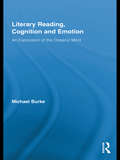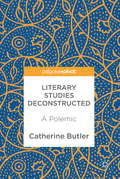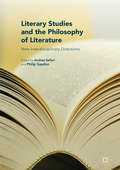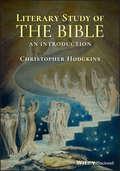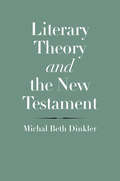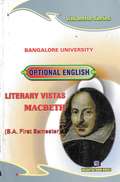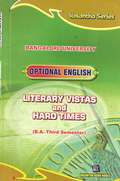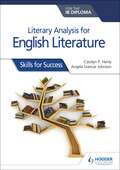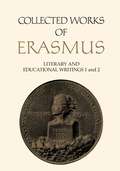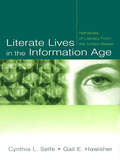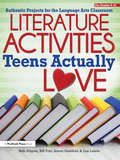- Table View
- List View
Literacy: Reading the Word & the World (Critical Studies in Education Series)
by Paulo Freire; Donaldo MacedoAt a time when popularizers of cultural literacy are prescribing a cultural canon for the purpose of prying open the `closed minds' of American youth . . . Literacy provides an articulate and courageous response. Harvard Educational Review Every chapter . . . asks teachers to thing again about how they teach, what they want for their pupils, and how to get on with it. Times Educational Supplement
Literacy: Reading the Word and the World (Critical Studies In Educationcritical Studies In Education)
by Paulo Freire Donaldo MacedoFreire and Macedo analyse the connection between literacy and politics according to whether it produces existing social relations, or introduces a new set of cultural practices that promote democratic and emancipatory change.
Literacy: Writing, Reading and Social Organisation (Routledge Library Editions: Literacy #16)
by John OxenhamOriginally published in 1980. The skills of reading and writing have been proclaimed as universal human rights. This book explores why this should be so. In particular, it examines whether or not the possession of reading or writing skills has, or has not, influenced the values and organisation of society. Viewing literacy as a technology, the author maintains that like all technologies, it is created by man for limited purposes. Nevertheless, given the right conditions, it can be used by man to change not only other technologies, but also himself and (in the end) all of his society. But like other technologies, literacy too may be subject to obsolescence which poses the all-important question of whether the advent of universal literacy has coincided with the redundancy of the written word.
Literale Praktiken und literarische Verstehensprozesse im Feld der Serialität: Eine rekonstruktive Studie
by Birgit SchlachterBirgit Schlachter begründet theoretisch und empirisch eine Theorie literaler Praktiken, die in praxeologischer und individuell-kognitiver Perspektive den außerschulischen Literalitätserwerb und die Interpretationskultur im Handlungsraum eines Online-Forums zur Jugendromantrilogie „Die Tribute von Panem“ fokussiert. Im Zuge der Rekonstruktion von literarischen Verstehensprozessen rücken insbesondere emotional-wertende Rezeptionsprozesse und deren Einfluss auf das Verstehen eines literarischen Textes in den Blick. Ausgangspunkt der GTM-Studie ist ein Serialitätskonzept, das auf der Textbasis von rund 50 mehrbändigen Serien und Zyklen der aktuellen Jugendliteratur entwickelt wurde und das literale Praktiken von Leserinnen und Lesern einschließt.
Literarily: How Understanding Bible Genres Transforms Bible Study
by Kristie AnyabwileDon&’t just read the Bible literally—read it Literarily.A lot of times, we treat Scripture like it&’s all the same from Genesis to Revelation. After all, it only has one Author. Isn&’t it just one big book, identical from beginning to end?While it&’s true that the Bible is unified, it is also diverse. The Bible can be grouped according to key categories, called genres, that help us to read and properly interpret the Scriptures. An understanding of these genres, and the literary themes and devices used within them, makes all the difference when encountering God&’s Word.Long-time Bible teacher Kristie Anyabwile discovered as she prepared her lessons that a single inductive approach doesn&’t do justice to the variety of genres that make up the Word of God. Because Scripture is a collection of writings that spans 1,500 years, many literary styles are represented and each must be taken into account for the fullest understanding of God&’s Word. Kristie shows you the immense value of studying the Bible literarily—that is, according to the literary style presented in a particular book, chapter, or passage. In Literarily, Kristie will take you through these eight distinct genres:LawHistoryProphecyPoetryGospelsEpistlesWisdomApocalypticThe Bible is an epic story that God has revealed to us through diverse genres and literary features. Its message and method are both meant to transform our hearts. Our goal as interpreters isn&’t to meld the Scriptures into a bland conglomerate, but to recognize the multiple forms in which God&’s Word comes to us. In so doing, we&’ll encounter the ongoing story of Jesus&’s redemption and learn how He calls His people to live in our complex world today.
Literarily: How Understanding Bible Genres Transforms Bible Study
by Kristie AnyabwileDon&’t just read the Bible literally—read it Literarily.A lot of times, we treat Scripture like it&’s all the same from Genesis to Revelation. After all, it only has one Author. Isn&’t it just one big book, identical from beginning to end?While it&’s true that the Bible is unified, it is also diverse. The Bible can be grouped according to key categories, called genres, that help us to read and properly interpret the Scriptures. An understanding of these genres, and the literary themes and devices used within them, makes all the difference when encountering God&’s Word.Long-time Bible teacher Kristie Anyabwile discovered as she prepared her lessons that a single inductive approach doesn&’t do justice to the variety of genres that make up the Word of God. Because Scripture is a collection of writings that spans 1,500 years, many literary styles are represented and each must be taken into account for the fullest understanding of God&’s Word. Kristie shows you the immense value of studying the Bible literarily—that is, according to the literary style presented in a particular book, chapter, or passage. In Literarily, Kristie will take you through these eight distinct genres:LawHistoryProphecyPoetryGospelsEpistlesWisdomApocalypticThe Bible is an epic story that God has revealed to us through diverse genres and literary features. Its message and method are both meant to transform our hearts. Our goal as interpreters isn&’t to meld the Scriptures into a bland conglomerate, but to recognize the multiple forms in which God&’s Word comes to us. In so doing, we&’ll encounter the ongoing story of Jesus&’s redemption and learn how He calls His people to live in our complex world today.
Literary Blunders: A Chapter in the "History of Human Error"
by Henry B. WheatleyLinguist Wheatley discusses typographical errors, "Irish bulls," deliberate and accidental misquotations, poor translations from other languages into English and vice versa, and errors of fact in student papers and examinations.
Literary Criticism: A Concise Political History
by Joseph NorthSince the global turn to neoliberalism in the 1970s, movements in literary studies have been diagnostic rather than interventionist: scholars have developed techniques for analyzing culture but have retreated from attempts to transform it. For Joseph North, a genuinely interventionist criticism is a central task facing scholars on the Left today.
Literary Forms Lesson 1 To 24
by Annamalai UniversityLiterature is a progressive mark of Man's civilization. It is an art that employs the medium of language but it is not just to communicate meaning in order to advance knowledge. It most appropriately preserves the treasures of the mind and soul. Yet the word literature commonly carries with it a clear suggestion of delimitation. How is the boundary drawn between a book on cookery and Paradise Lost or some other masterpiece? The border between the two is an area of uncertainly. Charles Lamb, the Romantic prose writer went to the extent of excluding the works of Hume and Gibbon together with almanacs and directories. On the other hand, Hallam included jurisprudence, theology and even medicine under the general head of literature.
Literary Knowing and the Making of English Teachers: The Role of Literature in Shaping English Teachers’ Professional Knowledge and Identities
by Brenton Doecke Lyn Yates Philip Mead Wayne Sawyer Larissa McLean DaviesAt a time when knowledge is being 're-valued' as central to curriculum concerns, subject English is being called to account. Literary Knowing and the Making of English Teachers puts long-standing debates about knowledge and knowing in English in dialogue with an investigation of how English teachers are made in the 21st century. This book explores, for the first time, the role of literature in shaping English teachers’ professional knowledge and identities by examining the impacts, in particular, of their own school teaching in their ‘making’. The voices of early career English teachers feature throughout the work, in a series of vignettes providing reflective accounts of their professional learning. The authors bring a range of disciplinary expertise and standpoints to explore the complexity of knowledge and knowing in English. They ask: How do English teachers negotiate competing curriculum demands? How do they understand literary knowledge in a neoliberal context? What is core English knowledge for students, and what role should literature play in the contemporary curriculum? Drawing on a major longitudinal research project, they bring to light what English teachers see as central to their work, the ways they connect teaching with their disciplinary training, and how their understandings of literary practice are contested and reimagined in the classroom. This innovative work is essential reading for scholars and postgraduate students in the fields of teacher education, English education, literary studies and curriculum studies.
Literary Neurodiversity Studies: Current and Future Directions (Literary Disability Studies)
by Bradley J. IrishThis book is a concise but comprehensive introduction to the field of literary neurodiversity studies, a growing approach to literary criticism that has emerged in the past decade. Its three parts are designed to: 1) introduce readers both to the general concept of neurodiversity and to current outlooks, approaches, and key scholarship from literary neurodiversity studies; 2) to present one possible vision of the future of literary neurodiversity studies, by offering an argument about how the field might further entwine with more general research on literary cognition, literary emotion, and literary sensation; and 3) to model for readers how one might perform a neurological reading of a literary text, by offering a sustained analysis of Shakespeare’s Othello. It also contains an extensive bibliography of existing scholarship from literary neurodiversity studies, which will provide an indispensable resource for new and experienced researchers in the field.
Literary Practices As Social Acts: Power, Status, and Cultural Norms in the Classroom
by Cynthia LewisThis book examines the social codes and practices that shape the literary culture of a combined fifth/sixth-grade classroom. It considers how the social and cultural contexts of classroom and community affect four classroom practices involving literature--read aloud, peer-led literature discussions, teacher-led literature discussions, and independent reading--with a focus on how these practices are shaped by discourse and rituals within the classroom and by social codes and cultural norms beyond the classroom. This book's emphasis on intermediate students is particularly important, given the dearth of studies in the field of reading education that focus on readers at the edge of adolescence.
Literary Reading, Cognition and Emotion: An Exploration of the Oceanic Mind (Routledge Studies In Rhetoric And Stylistics Ser. #1)
by Michael BurkeThis work seeks to chart what happens in the embodied minds of engaged readers when they read literature. Despite the recent stylistic, linguistic, and cognitive advances that have been made in text-processing methodology and practice, very little is known about this cultural-cognitive process and especially about the role that emotion plays. Burk’s theoretical and empirical study focuses on three central issues: the role emotions play in a core cognitive event like literary text processing; the kinds of bottom-up and top-down inputs most prominently involved in the literary reading process; and what might be happening in the minds and bodies of engaged readers when they experience intense or heightened emotions: a phenomenon sometimes labelled "reader epiphany." This study postulates that there is a free-flow of bottom-up and top-down affective, cognitive inputs during the engaged act of literary reading, and that reading does not necessarily begin or end when our eyes apprehend the words on the page. Burke argues that the literary reading human mind might best be considered both figuratively and literally, not as computational or mechanical, but as oceanic.
Literary Studies Deconstructed: A Polemic
by Catherine ButlerLiterary Studies Deconstructed critiques the state of Literary Studies in the modern university and argues for its comprehensive reconstruction. It argues that Literary Studies as currently practised avoids engaging with much of literary experience and prioritises instead the needs of critics as a professional community: to teach and assess students, to demonstrate the creation of knowledge, and to meet the demands of governments, funders and other bodies. The result is that many areas centrally important to lay readers are largely omitted from critical discussion. Moreover, critical writing and its conventions are framed so as to mask and repress the subject’s contradictions. This lively and provocative book will be of interest to undergraduate and postgraduate students with an interest in the critical profession or literary theory, as well as to Literary Studies academics.
Literary Studies and the Philosophy of Literature
by Andrea Selleri Philip GaydonThis book is about the interaction between literary studies and the philosophy of literature. It features essays from internationally renowned and emerging philosophers and literary scholars, challenging readers to join them in taking seriously the notion of interdisciplinary study and forging forward in new and exciting directions of thought. It identifies that literary studies and the philosophy of literature address similar issues: What is literature? What is its value? Why do I care about characters? What is the role of the author in understanding a literary work? What is fiction as opposed to non-fiction? Yet, genuine, interdisciplinary interaction remains scarce. This collection seeks to overcome current obstacles and seek out new paths for exploration.
Literary Study of the Bible: An Introduction
by Christopher HodgkinsThe most comprehensive and accessible introduction to scriptural art yet written Literary Study of the Bible: An Introduction approaches each book of the Bible (including several of the apocrypha) with non-sectarian literary questions, exploring the meanings that the Bible reveals when we read it like a poem, narrative, or play. As a unique hybrid of introductory guide, essential handbook, historical survey, and absorbing commentary, this book fills a gap in literary Bible study with its fresh perspectives on the biblical writers’ many arts. Readers will engage in wide range of textual approaches and interpretive traditions through this broadly informed, accessibly written text. Dr. Christopher Hodgkins has taught Literary Study of the Bible for 25 years, over which time he has field-tested the many lenses—of genre, image, language, characterization, plot, and craft—used throughout this book. Tracing the sources, composition, and influences of the Biblical text, this book places the Bible in a tradition of ancient near eastern, Hebrew, and Hellenistic literary art, giving new depth to the way we understand the familiar stories of scripture. Unlike other literary introductions to the Bible, this book uniquely combines these elements: Approaches the Bible as a richly collaborative and coherent work of literary art, exploring how earlier books influence the creation and interpretation of later ones Provides illuminating commentary supplemented by explanatory textboxes, maps, illustrations, and study questions to enhance interest and expand learning Introduces poetic and narrative devices like doubling, juxtaposition, and irony within the context of scriptural art and editorial design Gives extensive attention to each biblical book, resulting in the most comprehensive introduction to literary Bible study to date Presents these materials through an accessible and lively text permeated with references to both high and popular culture Literary Study of the Bible will be a welcome addition to personal, school, college, and congregational libraries, as well as an excellent text for students of the Bible in both secular and faith-based settings.
Literary Theory and the New Testament (The Anchor Yale Bible Reference Library)
by Michal Beth DinklerA comprehensive case for a fresh literary approach to the New Testament For at least a half century, scholars have been adopting literary approaches to the New Testament inspired by certain branches of literary criticism and theory. In this important and illuminating work, Michal Beth Dinkler uses contemporary literary theory to enhance our understanding and interpretation of the New Testament texts. Dinkler provides an integrated approach to the relation between literary theory and biblical interpretation, employing a wide range of practical theories and methods. This indispensable work engages foundational concepts and figures, the historical contexts of various theoretical approaches, and ongoing literary scholarship into the twenty-first century. In Literary Theory and the New Testament, Dinkler assesses previous literary treatments of the New Testament and calls for a new phase of nuanced thinking about New Testament texts as both ancient and literary.
Literary Vistas & Macbeth (Optional English) For B.A. Sem-I - Bangalore University
by Vasantha SeriesAs per the New CBCS Syllabus of I Sem. B.A. - Bangalore University. Also Useful for Semester Schemes of All Other Universities.
Literary Vistas & Novel (Optional English) for B.A. Sem-II - Bangalore University
by Vasantha SeriesAs per the New CBCS Syllabus of Literary Vistas & Novel British Literature (1340 - 1830) and Facets of Language & EMMA II Semester B.A. Optional English Bangalore University. Also Useful for Semester Schemes of All Other Universities.
Literary Vistas and Hard Times (Optional English) For B.A. Sem-III - Bangalore University
by Vasantha SeriesAs per the New CBCS Syllabus of III Sem. B.A. - Bangalore University. Also Useful for Semester Schemes of All Other Universities.
Literary analysis for English Literature for the IB Diploma: Skills for Success
by Angela Stancar Johnson Carolyn P. HenlyBuild confidence in a range of key literary analysis techniques and skills with this practical companion, full of advice and guidance from experienced experts.- Build analysis techniques and skills through a range of strategies, serving as a useful companion throughout the course - from critical-thinking, referencing and citation and the development of a line of inquiry to reflecting on the writing process and constructing essays for Paper 1 and Paper 2- Develop skills in how to approach a text using literary analysis strategies and critical theory, for both unseen literary texts (the basis of Paper 1) and texts studied in class - Learn how to engage with texts so that you can write convincingly and passionately about literature through active reading, note-taking, asking questions, and developing a personal response to texts- Concise, clear explanations help students navigate the IB requirements, including advice on assessment objectives and how literary analysis weaves through Paper 1, Paper 2, the HL Essay, Individual Oral and the Learner Profile- Engaging activities are provided to test understanding of each topic and develop skills for the exam - guiding answers are available to check responses
Literary analysis for English Literature for the IB Diploma: Skills for Success
by Angela Stancar Johnson Carolyn P. HenlyBuild confidence in a range of key literary analysis techniques and skills with this practical companion, full of advice and guidance from experienced experts.- Build analysis techniques and skills through a range of strategies, serving as a useful companion throughout the course - from critical-thinking, referencing and citation and the development of a line of inquiry to reflecting on the writing process and constructing essays for Paper 1 and Paper 2- Develop skills in how to approach a text using literary analysis strategies and critical theory, for both unseen literary texts (the basis of Paper 1) and texts studied in class - Learn how to engage with texts so that you can write convincingly and passionately about literature through active reading, note-taking, asking questions, and developing a personal response to texts- Concise, clear explanations help students navigate the IB requirements, including advice on assessment objectives and how literary analysis weaves through Paper 1, Paper 2, the HL Essay, Individual Oral and the Learner Profile- Engaging activities are provided to test understanding of each topic and develop skills for the exam - guiding answers are available to check responses
Literary and Educational Writings, 1 and 2: Volume 1: Antibarbari / Parabolae. Volume 2: De copia / De ratione studii (Collected Works of Erasmus #23-24)
by Craig Thompson Desiderius ErasmusThese volumes are the first in a series containing works by Erasmus 'that concern literature and education': interests which to him were scarcely separable. The aim of Erasmian education was a civilized life, expressed in Christian piety and the fulfilment of public and private duties and embellished by learning and literature. Towards these ends the soundest training for youth was what Erasmus often called bonne litterae, 'good letters,' a literary and rhetorical training based on Greek and Latin authors. For centuries the classical curriculum was the core of liberal education, and Erasmus was long regarded as its exemplar. Though never a university teacher except briefly at Cambridge (1311-14), he was a 'teacher of teachers' through his treatises on pedagogy and rhetoric and his many works of scholarship. The four works presented here in annotated translations are characteristic expressions of his dedication to learning and his confidence in the values of classical literature for the modern world of his time. Antibarbari (1520), translated and annotated by Margaret Mann Phillips, is a defence of the humanities against ignorant and misguided critics who question both their supposed worth and the appropriateness of pagan writings for Christian pupils. The reply of Erasmus becomes a manifesto on behalf of reason, scholarship, and literature. As for paganism, he insists that if secular knowledge is used properly it cannot harm but must help Christians. 'None of the liberal disciplines is Christian' because they all antedated Christianity, yet they 'all concern Christ' because they can be put to Christian uses. Parabolae (1514), translated and annotated by R.A.B. Mynors, a work that 'contributes eminently to style,' is a collection of similitudes drawn from observations of men, customs, and nature. Many are culled from Plutarch and Seneca, but for those from Seneca, and from Aristotle, the moral applications are added by Erasmus. As an exercise in the rhetoric of moral philosophy - 'many jewels in one small box,' Erasmus terms it-this book quickly became popular and long remained so. De copia (1512), translated and annotated by Betty I. Knott, is not a plan for the entire curriculum but a treatise on the 'abundant' or rich style in writing and speaking Latin, a guide to attaining fluency and variety in discourse. As a manual for students De copia broke new ground. It was a remarkably successful work, used in schools in many lands for generations. From 1312 to 1600, more than 130 printings are recorded. De ratione studii (1312), translated and annotated by Brian McGregor, furnishes a concise but clear exposition of the curriculum, text, and methods of Erasmus' programme for liberal studies in grammar schools. Here as in all of his writings on education, language is the heart of the matter. The main goals are accurate, effective expression and communication in Latin, though Erasmus expects much besides literature to be learned from the study of literature. He emphasizes the necessity for competent and sympathetic teachers. Each translation is introduced by the translator, and a general introduction by the editor discusses the significance of each of the works, its relation to the others, and its subsequent fortunes. Wallace K. Ferguson provides an introductory essay, 'The Works of Erasmus.' Volumes 23 and 24 of the Collected Works of Erasmus series – Two-volume set.
Literate Lives in the Information Age: Narratives of Literacy From the United States
by Cynthia L. Selfe Gail E. HawisherThis book chronicles the development of electronic literacies through the stories of individuals with varying backgrounds and skills. Authors Cynthia L. Selfe and Gail E. Hawisher employ these stories to begin tracing technological literacy as it has emerged over the last few decades within the United States. They selected 20 case studies from the corpus of more than 350 people who participated in interviews or completed a technological literacy questionnaire during six years of their study. The book is organized into seven chapters that follow the 20 participants in their efforts to acquire varying degrees of technological literacy. Each chapter situates the participants' life-history accounts in the cultural ecology of the time, tracing major political, economic, social, and educational events, factors, and trends that may have influenced--and been influenced by--literacy practices and values. These literacy histories are richly sown with information that can help those in composition and writing studies situate the processes of acquiring the literacies of technology in specific cultural, material, educational, and familial contexts. These case studies provide initial clues about combinations of factors that affect--and are affected by--technological literacy acquisition and development. The first-hand accounts presented here offer, in abundant detail, everyday literacy experiences that can help educators, parents, policymakers, and writing teachers respond to today's students in more informed ways.
Literature Activities Teens Actually Love: Authentic Projects for the Language Arts Classroom (Grades 9-12)
by Beth Ahlgrim Bill Fritz Jeremy GertzfieldInstead of asking literature to meet the entertainment, cultural, and of course educational needs of today's youth, Literature Activities Teens Actually Love empowers teachers to guide students in working with literature on their own terms in order to rediscover the joys it holds. Through a variety of innovative and highly engaging projects, this book will develop a new lens through which to view literature and its study, with activities that are at once highly entertaining yet encourage higher order thinking skills and strategies. Lesson plans incorporating alternatives as diverse as Facebook and quilting show how teachers and students can bridge the technology gap by finding creative solutions to traditional academic problems. By allowing students to use their technological skills to move from print to nonprint assessments, students will have the opportunity to explore the text with a greater degree of ownership over the process, resulting in autonomous learners. Grades 9-12
